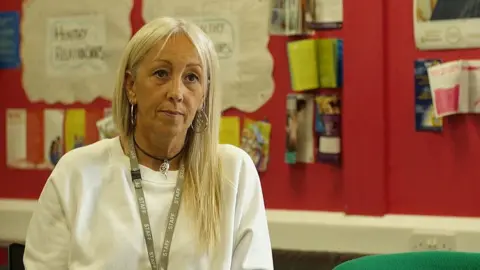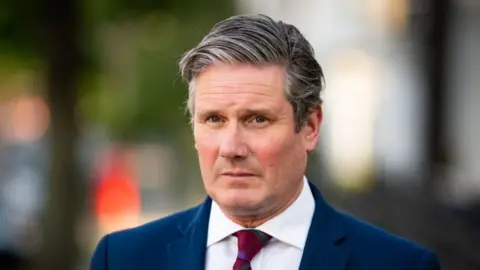Coronavirus: Johnson sets out 'ambitious' economic recovery plan
Boris Johnson has said now is the time to be "ambitious" about the UK's future, as he set out a post-coronavirus recovery plan.
The PM vowed to "use this moment" to fix longstanding economic problems and promised a £5bn "new deal" to build homes and infrastructure.
Plans set out in the Tory election manifesto would be speeded up and "intensified," he added.
Labour and the CBI said he was not focusing enough on saving jobs.
Labour leader Sir Keir Starmer said there was "not much of a deal and not much that's new".
The BBC's economic editor, Faisal Islam, said there was "nothing really new" in the plans, but was a pledge from the Treasury to "speed up capital investment that has already been announced and tolerate higher levels of debt".
Chancellor Rishi Sunak later confirmed he would deliver an economic update on 8 July "setting out the next stage in our plan to secure the recovery".
The PM's speech came as new figures showed the UK economy shrank faster than at any time since 1979 between January and March.
In a wide-ranging speech in Dudley, in the West Midlands, Mr Johnson vowed to "build, build, build" to soften the "economic aftershock" of coronavirus.
He said the government wanted to continue with its plans to "level up" - one of its main slogans of last December's election - as "too many parts" of the country had been "left behind, neglected, unloved".
Infrastructure projects in England would be "accelerated" and there would be investment in new academy schools, green buses and new broadband, the PM added.
Projects in the £5bn investment plan include:
- £1.5bn for hospital maintenance and building, eradicating mental health dormitories and improving A&E capacity - the government said this is "new" money in addition to £1.1bn in its Spring Budget
- £100m for 29 road projects including bridge repairs in Sandwell and improving the A15 in the Humber region - this money had already been announced
- Over £1bn for new school buildings, as announced on Monday - this cash comes from the government's existing infrastructure plan
- £12bn to help build 180,000 new affordable homes for ownership and rent over the next eight years - brings together three pots of money already announced by previous Tory governments and Mr Johnson's administration
Other projects announced in the government's Spring Budget, which will now be accelerated, include:
- £83m for maintenance of prisons and youth offender facilities, and £60m for temporary prison places.
- £900m for "shovel ready" local projects in England this year and in 2021
- £500,000 - £1m for each area in the towns fund to spend on improvements to parks, high street and transport
'Economic impact'
Mr Johnson acknowledged jobs might be lost because of the economic hit from the pandemic, but said a new "opportunity guarantee" would ensure every young person had the chance of an apprenticeship or placement.
Asked whether the plans went far enough for those who end up unemployed, the PM said the strategy was for "jobs, jobs, jobs" and there would not be a return to austerity.
But he could not put a figure on how many roles would be created through his plan, adding: "We don't yet know what the full economic impact is going to be... [but] we will do everything we can to get this economy moving."


The prime minister loves a big, historical comparison.
He is a keen student of Winston Churchill - and has even written a book about him.
Over the last few days, the comparisons the government has sought to draw have been with former American President Franklin Delano Roosevelt and his "New Deal."
As my colleagues at Reality Check point out, the plan set out today is a tiddler compared to what FDR did, and a fair chunk of it is re-announcing what we already knew the government was planning.
But Boris Johnson is attempting to set out in a broader context the government's vision - and his pride in saying he wants to spend a lot to revitalise the economy and haul it out of the doldrums.

Under what Mr Johnson dubbed "project speed," planning laws would also be streamlined to encourage building.
Changes, planned for September, include:
- Allowing many commercial buildings to change to residential use without planning application
- Cutting the normal planning process for builders who want to demolish and rebuild vacant residential and commercial buildings as homes
- Allowing homeowners to build above their properties "via a fast track approval process" and subject to neighbour consultation
Pubs, libraries, village shops will be protected from the changes as they were "essential to the lifeblood of communities," the government said.
Mr Johnson acknowledged the planning changes might meet resistance in traditional Tory-voting areas, but said: "Sometimes you have got to get on with things."


The government believes their existing plans for boosting infrastructure spending are already a significant fillip to the economy, and they want to see what happens as it re-opens.
One set of figures released today shows household savings increased during lockdown, but will people have the confidence to spend?
The scale of government support for businesses and employees in recent months probably does justify New Deal-style rhetoric. Extending support at that level may yet be required, and is far from ruled out.
But for now, they are holding fire as they assess the permanent scars to the UK economy.

Mr Johnson also attempted to calm Tory fears that he had shifted to the left, saying: "I am not a communist".
Instead, he claimed he had been inspired by US president Franklin D Roosevelt, who led America out of the Great Depression with his New Deal in the 1930s.
In the aftermath of the Wall Street Crash of 1929, President Roosevelt launched one of the largest, most expensive US government programmes which included building schools, hospitals and dams.

The view from South Yorkshire Tory constituency

In the former "red wall" seat of Rother Valley - which the Conservatives won from Labour for the first time at last year's general election - there has been a mixed reaction to the announcement from employees and business owners.
David Shaw, operations manager for a manufacturing company, said the investment announcement was "positive" and praised the government's furlough scheme during the crisis for saving businesses.
But Lisa Williams, manager of a youth and community centre in Dinnington, said of the promised investment that "we've yet to see that happen".
"Year-on-year, successive governments have made promises, and these areas have yet to see that," she said, adding she was concerned about the economic impact on young people.
And Jayne Maxwell, a shop owner in Maltby, said she was sceptical about how much investment would go into high streets, saying more short-term help was needed.

Labour Leader Sir Keir Starmer said: "We're facing an economic crisis, the biggest we've seen in a generation and the recovery needs to match that. What's been announced amounts to less than £100 per person.
"And it's the re-announcement of many manifesto pledges and commitments, so it's not enough."
 PA Media
PA MediaThe Labour leader added: "We're not going to argue against a recovery plan, but the focus has to be on jobs."
CBI Director General Carolyn Fairbairn said the prime minister had set out the "first steps on the path to recovery" but added that "the focus on rescuing viable firms cannot slip".
